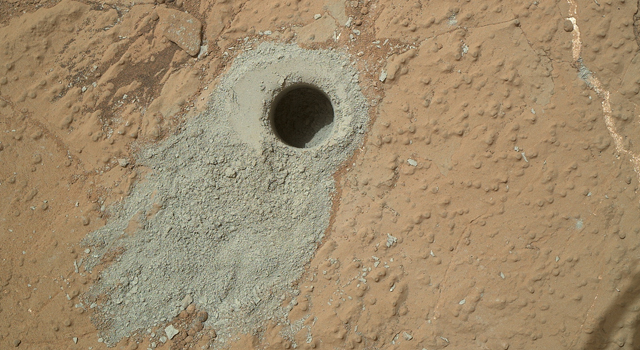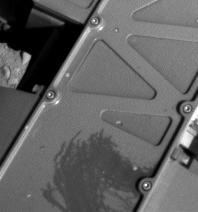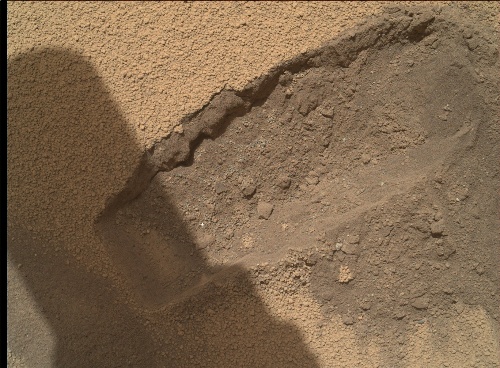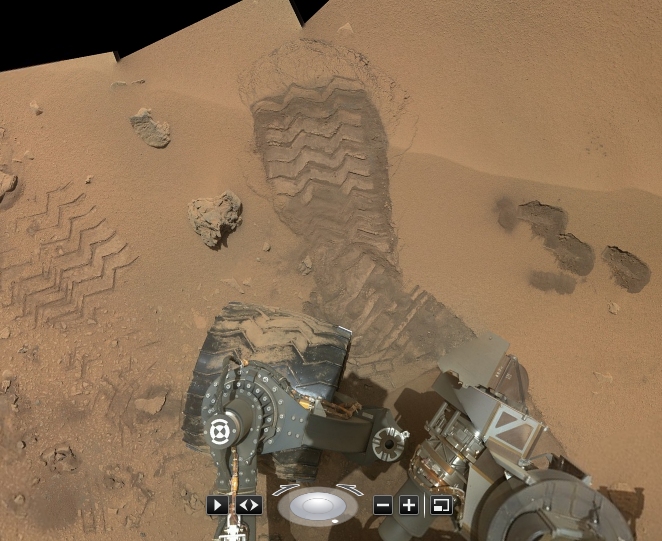It looks like you're using an Ad Blocker.
Please white-list or disable AboveTopSecret.com in your ad-blocking tool.
Thank you.
Some features of ATS will be disabled while you continue to use an ad-blocker.
share:
originally posted by: wildespace
This is just darker dust/sand underneath the lighter iron oxide coating that gives Mars its familiar red colour.
This material has been exposed when the rover took scooped samples for chemical analysis:
or even exposed by the rover's wheels:
Those tracks appear to be damp, one more than the other, how can you account for the exact effect as slightly damp dirt/sand
under the dry surface ??
originally posted by: ParasuvO
originally posted by: wildespace
This is just darker dust/sand underneath the lighter iron oxide coating that gives Mars its familiar red colour.
This material has been exposed when the rover took scooped samples for chemical analysis:
or even exposed by the rover's wheels:
Those tracks appear to be damp, one more than the other, how can you account for the exact effect as slightly damp dirt/sand
under the dry surface ??
Well, appearances don't count for much in science, so it's really a subjective opinion to bring dampness into this. Curiosity rover has an instrument that measures air humidity, and the scooped sample (which is the same darker material exposed by the wheels) was analysed chemically. The only water there is, is bound into minerals.
In case anyone's interested, here are the "weather reports" from Curiosity's instruments: cab.inta-csic.es...
I couldn't find humidity data there, but someone on the Unmanned Spaceflight Forum commented to me that Mars is dryer than the Death Valley in California. On the other hand, this article by NASA says that Curiosity's data shows that salty brine could form in the martian soil for short periods of time: mars.nasa.gov...
However, I'm very confident that those dark patches of exposed ground are not damp; they are really just darker material under the lighter iron oxide dust coating. The only lighter-coloured material I've seen on Mars is rocks and mineral veins. For example, these drill tailings:

a reply to: wildespace
Way, way drier. Drier even than Atacama. Which is drier than Death Valley.
The dampest place on Mars is drier than the driest place on Earth.
Mars is really dry.
I couldn't find humidity data there, but someone on the Unmanned Spaceflight Forum commented to me that Mars is dryer than the Death Valley in California.
Way, way drier. Drier even than Atacama. Which is drier than Death Valley.
The dampest place on Mars is drier than the driest place on Earth.
Mars is really dry.
edit on 6/7/2015 by Phage because: (no reason given)
a reply to: wildespace
I was quite interested in this , until I went to the page ... half a job springs to mind.. why no wind speed data ?
funbox
In case anyone's interested, here are the "weather reports" from Curiosity's instruments: cab.inta-csic.es...
I couldn't find humidity data there, but someone on the Unmanned Spaceflight Forum commented to me that Mars is dryer than the Death Valley in California. On the other hand, this article by NASA says that Curiosity's data shows that salty brine could form in the martian soil for short periods of time: mars.nasa.gov...
I was quite interested in this , until I went to the page ... half a job springs to mind.. why no wind speed data ?
funbox
You must remember that the density of the atmosphere is directly related to size of particle it can suspend. The Martian atmosphere is 0.6% of that of
Earth's. Therefore it can only carry dust. A Martian dust devil would feel like someone one above you sprinkling Talcompowder over you from the floor
above - barely noticeable. Not like a dust/sand storm here on Earth!
"Dust Trickles".....LOL
Sometimes, the right answer is the simple one.
It's water. Mars has liquid water.
It's time to stop denying the obvious.
Sometimes, the right answer is the simple one.
It's water. Mars has liquid water.
It's time to stop denying the obvious.
a reply to: poncho1982
I'm sure this will be Main Stream knowledge in 5-10 years. But for now, only us Looney Tunes think so
I'm sure this will be Main Stream knowledge in 5-10 years. But for now, only us Looney Tunes think so
a reply to: ParasuvO
There is water and ice under the surface
blogs.discovermagazine.com...
www.space.com...
There is water and ice under the surface
But liquid brines might be abundant across Mars’ surface. So, some further trekking might eventually reveal whether any salty critters still call those soils home.
blogs.discovermagazine.com...
The probes dug into the ground, examining rocks and performing experiments. In 2008, Phoenix turned up small chunks of bright material that disappeared after four days, leading scientists to surmise that they were pieces of water ice.
www.space.com...
originally posted by: FlyingFox
Doesn't the low humidity make dampness an unlikely condition?
Water forms on the rover and there are many pictures that show possible damp, water beading and surface track damp.
There are clouds on Mars (nice cloud shot here)
www.astrobio.net...

If these are NOT water they must be life forms.
Scientists Photograph Possible Water Droplets on Mars Lander - See more at: www.dailytech.com...
originally posted by: poncho1982
"Dust Trickles".....LOL
Sometimes, the right answer is the simple one.
It's water. Mars has liquid water.
It's time to stop denying the obvious.
clear and obvious.
new topics
-
What Am I Hearing
General Chit Chat: 1 hours ago -
A Bunch of Maybe Drones Just Flew Across Hillsborough County
Aircraft Projects: 7 hours ago -
Who's coming with me?
General Conspiracies: 8 hours ago
top topics
-
The NIH is still sending taxpayer money to Chinese Labs to Conduct cruel animal experiments
Mainstream News: 12 hours ago, 12 flags -
FBI Director CHRISTOPHER WRAY Will Resign Before President Trump Takes Office on 1.20.2025.
US Political Madness: 12 hours ago, 9 flags -
A Bunch of Maybe Drones Just Flew Across Hillsborough County
Aircraft Projects: 7 hours ago, 7 flags -
Who's coming with me?
General Conspiracies: 8 hours ago, 4 flags -
Angela Merkel is terrified of dogs
Politicians & People: 14 hours ago, 3 flags -
What Am I Hearing
General Chit Chat: 1 hours ago, 1 flags
active topics
-
Drones everywhere in New Jersey
Aliens and UFOs • 69 • : imitator -
From the MUSK-RAMASWAMY Department of Government Efficiency commission - DOGE.
Above Politics • 62 • : Irishhaf -
-@TH3WH17ERABB17- -Q- ---TIME TO SHOW THE WORLD--- -Part- --44--
Dissecting Disinformation • 3626 • : duncanagain -
What Am I Hearing
General Chit Chat • 0 • : charlest2 -
Rant. I am sick of people saying the police are revenue raising.
Rant • 9 • : inflaymes69 -
A Bunch of Maybe Drones Just Flew Across Hillsborough County
Aircraft Projects • 15 • : Mantiss2021 -
Remember These Attacks When President Trump 2.0 Retribution-Justice Commences.
2024 Elections • 98 • : WeMustCare -
President-Elect DONALD TRUMP's 2nd-Term Administration Takes Shape.
Political Ideology • 297 • : WeMustCare -
Who's coming with me?
General Conspiracies • 27 • : AlroyFarms -
Will all hell break out? Jersey drones - blue beam
Aliens and UFOs • 39 • : Arbitrageur



